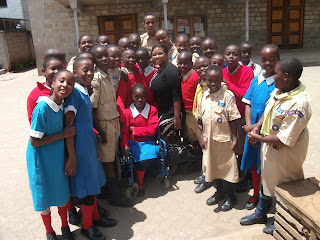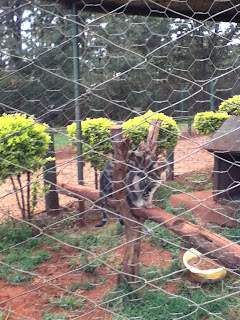Before I traveled to Kenya, experienced Nairobi, learned about the government, visited residents of Kiambiu slum, and spoke to children at Holy Trinity's St. Joseph school, I could not imagine how helpless the conditions render the Kenyan population. Those I met were hard workers, scrounging for work in a country where the government does not enforce the minimum wage. They do the best they can making $2.00 per day, eating rotten fish, suffering from dehydration, studying in makeshift classrooms, wearing the same uniform to school every day because that is all their parents can afford. There were no welfare checks issued to the residents I met in Kiambiu. They received no subsidies for housing in the slums. In a country where the piped water is filthy and many roads are still unpaved, the government could not afford to sustain the living expenses for its disadvantaged even if it cared to. I came from the land of opportunity to a land where opportunities are only for the lucky or the rich.
Enter Fr. George, Holy Trinity, the worldwide Catholic Church. Many of my friends were surprised when I took a position at the Archdiocese of Washington, because I am not Catholic...not even religious. I told them that while I may not subscribe to the same religious beliefs, I do subscribe to the mission of charity. Wherever in the world I've gone, the Catholic Church was also there, working alongside governments and groups, giving people hope and opportunity, regardless of faith. Holy Trinity carries out this mission with such zeal and compassion, it made me question why it took me so long to come, why it took me so long to help.
I left Holy Trinity a very small token of appreciation, and made a commitment to myself to do more. Those of you who know me well know how I feel about handouts. The only charities worth supporting are those which push its beneficiaries toward self-reliance. I only care to help people who help themselves.
Fr. George uses Holy Trinity's resources to give those in his community the best chance at survival and excellence. His faithful teachers facilitate learning in rooms of houses and sections of the church hall. His congregation subsidizes education for impoverished children at St. Joseph and pays secondary school fees for select teenagers from Kiambiu. He and his parishioners visit the sick, elderly, and downtrodden and provides them with food, medicine, and other things they need to keep struggling toward a better future. Still, hard working Kenyans line up at his office each week, seeking food, blankets, work referrals, just enough to make it until they can earn another few shillings to make it on their own.
I did not engage in the type of volunteerism I thought I would when I asked Fr. Celestino if it would be appropriate for me to volunteer for one week. Admittedly, I was disappointed with the way things were going, moving from place to place, only getting an overview of the services real workers were providing - not actually doing anything myself. I was embarrassed by the amount of attention and celebration surrounding me at each place I visited. I told Peter not to take anymore pictures of me with indigent people. I wanted to be of service, not a nuisance or distraction (or attraction). I honestly felt like a useless politician going from place to place, taking pictures and giving talks with no real substance to offer.
Then, it hit me.
The best way for me to be of service was to observe, remember, and call on my friends to help. By reading my blog, you know my thoughts and experiences. You know about the remarkable people I met who do the best they can with an often depraved government and little private capital. You know how they welcomed me and shared what little they had in honor of my visit.
I ask you to share a little of what you have to honor their struggle for life.
To send a donation directly to PMS Kenya, please use the information below or email Father Celestino Bundi, director of PMS Kenya, at pmskenya@catholicchurch.or.ke.
BANK
NAME – CFC STANBIC BANK
BANK
ADDRESS - P.O.BOX 30550 – 00100 NAIROBI KENYAACCOUNT NAME – PONTIFICAL MISSIONARY SOCIETIES
ACCOUNT BRANCH – WESTLANDS – WAIYAKI WAY
ACCOUNT NO - 0100000495276
CURRENCY KSHS – KES
SWIFT CODE – SBICKENX
BANK CODE - 31000
CORRESPONDENT
BANK
NAME
– DEUTSCHE BANK AGSWIFT CODE - BKTRUS 33
CURRENCY - USD
The physical address is:
PONTIFICAL
MISSIONARY SOCIETIES
WAUMINI
HOUSE 3RD FLOOR – EASTERN WINGCHIROMO ROAD
P.O. BOX 48062 – 00100 GPO
NAIROBI – KENYA.
TEL.LAND
LINE: +254 4443133
MOBILE PHONE: +254 725 277 277TELEFAX +254 4442910
Thank you for reading my blog and helping me make a difference.






















































